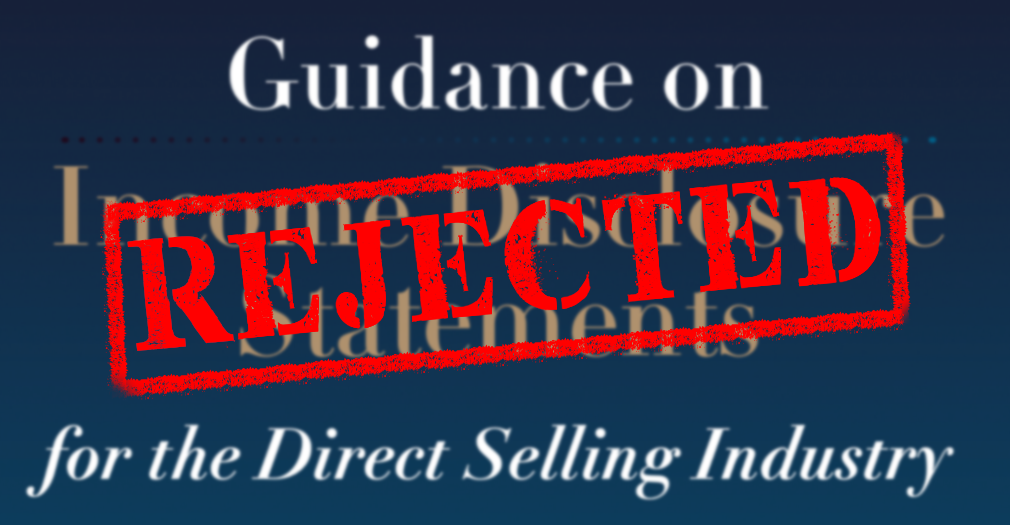
FTC Staff Urge MLMs Not to Rely on Industry Income Disclosure Guidance
Advisory opinion letter raises “serious concerns” with self-reg group’s guidance.
Does free speech protect deceptive advertising?
| Fran Silverman
I am a card-carrying member of the New England First Amendment Coalition. (Ok, maybe there’s no actual card, but the point is I am a member of its advisory board, and its mission speaks for itself.) I am a passionate believer in French philosopher Voltaire’s declaration: “I do not agree with what you have to say, but I’ll defend to the death your right to say it.” A postcard featuring that statement hangs on my bulletin board above my desk here at TINA.org. This belief has gotten me into several arguments with friends in my life who think some people should just shut up. But I always hold fast to a person’s right to express his/her opinion, however unctuous it may be.
And yet, as a free speecher I’m alarmed at the attempts in recent months being made by companies to use the First Amendment to defend commercial speech that is false or misleading.
I don’t think the Founding Fathers had POM Wonderful in mind when they wrote that very first amendment to the newly minted Constitution. I believe it had to do with their passion to ensure a robust exchange of ideas and the ability of the new nation’s citizens to criticize their government roundly without being tossed into jail.
To be clear, there are restrictions to free speech. You know, you can’t yell “fire” in a theater if there really isn’t one or give away government secrets. And the government can restrict commercial speech if it is misleading, concerns an illegal activity, or if the government has a “substantial interest” in restricting such speech. The government also has a right to force companies to reveal certain information to consumers.
Yet numerous companies, perhaps emboldened by the Supreme Court’s Citizen’s United decision, which extended First Amendment rights to corporations, are increasingly using free speech defenses in court. This “corporate takeover” of free speech was revealed in a recent story by Tim Wu in The New Republic.
POM Wonderful is using the First Amendment to wage a lengthy court battle against a 2010 Established in 1914 under President Woodrow Wilson, the FTC is the United States government’s primary regulatory authority in the area of consumer protection and anti-competitive business practices in the marketplace. Its Bureau of Consumer Protection assumes the lead in the Commission’s efforts to eliminate deceptive advertising and fraudulent business practices at work in the economy. ruling ordering the company to stop making deceptive claims that its pomegranate juice could prevent, treat, or reduce the risk of an assortment of ailments, including heart disease and erectile dysfunction. POM appealed the FTC decision, contending that its claims are protected speech and that the FTC had set a new standard to back this claim. Several industry groups filed briefs in POM’s favor in the pending case.
Recent court decisions on commercial speech have been a mixed bag.
Last summer, a federal judge threw out graphic warning labels for cigarettes on the grounds that they were a form of “compelled speech” that promoted the government’s view, and there was no proof it was necessary to help prevent consumers from smoking.
The argument that the government can’t compel speech was at the center of a defense by two airline companies, Southwest and Spirit, which do not want to have to list the full price of airline tickets without clearly delineating government taxes. But the government wanted consumers to see the full price without having to add up all the items that made up the costs. In April, the Supreme Court refused to hear the case.
Another recent ruling gave pharmaceutical companies some hope about what they can say about unapproved, off-label use of certain drugs. In December, a federal appeals court ruled that a pharmaceutical rep did not violate law when he promoted the drug Xyrem for off-label use. The ruling overturned the salesman’s conviction on conspiracy charges. While the FDA said the salesman violated federal law, the salesman appealed the conviction, arguing he had a right under the First Amendment to market the off-label use of a prescription drug. The ruling has implications for misleading advertising because it could go to the very heart of who can disseminate information about drugs and what information needs to be revealed to consumers about any possible consequences of using the drugs for the off-label treatment of health issues.
This whole issue gives me a stomachache. The courts have ruled that economically focused speech can serve the pubic interest and can be protected. That sounds appealing to me, protecting speech in the public interest and all. But digging deeper, how is it in the public interest to say something like pomegranate juice has health benefits when it’s never been proven? It’s only in the company’s financial interest. How is it helpful not to know what the full price of an airline ticket is just because an airliner doesn’t want its ticket costs to be lumped in with required federal taxes? That’s only in the airline’s financial interest. I need to know what the darn price is so I can budget my trip accordingly. And if pharmaceutical reps can tout the off-label use of drugs, shouldn’t they also have to reveal any of the drug’s possible side effects like companies have to do for other prescription drugs? I’d want to know that before I take a pill for dry skin that was originally approved to treat toenail fungus, or something.
I don’t see this as a free speech issue. To me, it’s simply a consumer’s right-to-know issue.
UPDATE 5/2/16: The Supreme Court declined to review POM’s First Amendment appeal and the D.C. Circuit’s ruling upholding the FTC’s findings that the company misled consumers in advertising their products.
Advisory opinion letter raises “serious concerns” with self-reg group’s guidance.
It may surprise you.
Why TINA.org supports FTC’s proposed changes to COPPA Rule but pushes for more.


